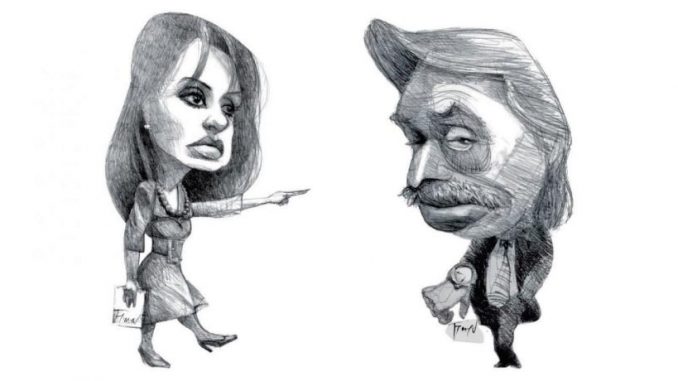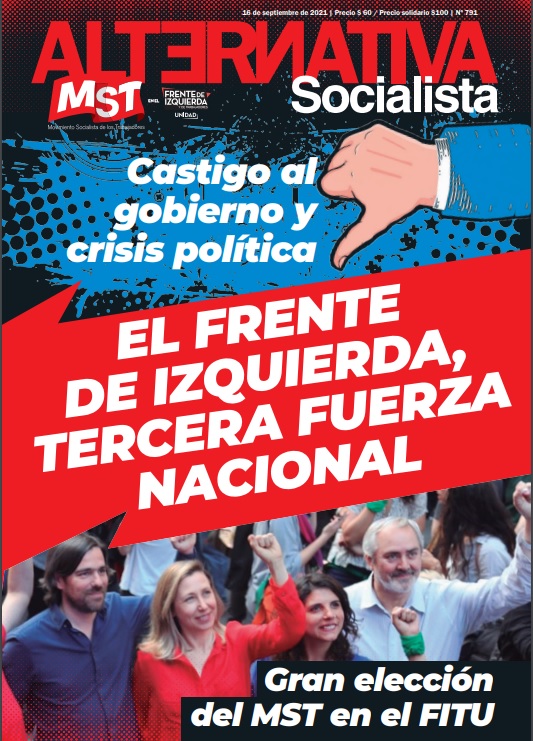
By Guillermo Pacagnini
The clear and overwhelming defeat of the government of the Frente de Todos was the main outcome of the legislative primaries of September 12. The bourgeois opposition, macrismo, capitalized the majority of this punishment-vote, although it did not experience a structural growth. The “Milei phenomenon” was a novelty that is even more to the right, but it was limited to the City of Buenos Aires. The positive and fundamental fact coming out of these primaries was the emergence of the Left as the third national force. This opens up a scenario of greater political and social crisis, and of great challenges for the struggles and the Left.
Causes and consequences of a resounding defeat

The government of the Frente de Todos lost 4 million votes compared to 2019 and was defeated in 17 provinces, including the main political centers of the country. The qualitative element was the political earthquake in the land of Kicillof and Cristina: the Province of Buenos Aires. They hoped to win and even launched a premature celebration, but they were swept away in almost all municipalities. The bonus track? Their defeat in Santa Cruz, the birthplace of kirchnerism. All the internal lines of the puzzle that they put together as the ruling coalition were compromised. The president roamed like a groggy boxer. Sergio Massa lost even in his stronghold in Tigre. The same was true for Kirchnerism, commanded by the vice president and for the candidates placed by Alberto himself. The Governors also received a hard blow. And those who survived the storm did so because they detached themselves from the ruling party and campaigned with a local profile.
No one doubts the defeat or its magnitude. Beyond phrases like “we have not done things well” and “we have heard” coming from the president after the results, it is difficult for the ruling party to fabricate a solid self-critical account. On the contrary, crisis and confusion prevail and they are trying to overcome the crossfire and reunify ranks seeking to recover from the blow.
The central cause for this is the tremendous decline in the standard of living of workers and popular sectors. That generates the bad social mood, anger and conflict that preceded the election. The refrigerators are still empty. A scenario of social catastrophe due to the economic crisis, aggravated by the pandemic and the austerity measures that made the workers and poor pay for the crisis. 51% of poverty (70% in young people), devaluation of wages, 14% of unemployment and a growing decline in living standards were accompanied by a questionable management of the pandemic that already left more than 112,000 dead.
In this way, the expectations of millions who believed that the government arrived to change the disasters of Macri were defrauded. Instead, by validating the debt with the IMF, not expropriating Vicentin, granting less than palliative social assistance in the pandemic, not really stopping layoffs and late and insufficient vaccination, it generated this climate of anger and attrition.
There were also political factors that produced the final blow, such as the photographs of the party in Olivos (the presidential residence) showing political privileges and other postcards that splashed the government and the regime as a whole, increasing popular mistrust with the entire political establishment. We will surely soon see consequences in the governance, to the point that the CGT has once again demanded the implementation of a “social agreement”. Also in the November elections, where the government could lose its own quorum in Congress and a majority in the Senate. It is a horizon of greater instability due to the changes that are coming on the political map and in the field of social struggle. There is talk of cabinet changes and they will surely rethink some tactics to try to retake the initiative and contain the drain. But they have to face negotiations with the IMF, structural adjustment in exchange for the agreement of “extended facilities” and more hardships for the working class and the people.
The punishment-vote is not a turn to the right
As opposition, Juntos por el Cambio and its variants appeared as the winners throughout the country, with some two million votes more than the ruling party. But despite what some voices sympathetic to the government say, there was no shift to the right: JxC maintained its level of votes, it did not grow.

The vote for this pro-business opposition, with a component of punishment-vote and backwardness in conscience, shows that a section of the masses mistakenly wanted to punish the government using this alternative, that is, the previous government. In addition, JxC benefited from its primaries: the UCR presented lists that benefited the coalition, but even so it has not managed to overcome its own leadership crisis that comes from the weakening of Macri. Neither did someone to replace him emerge from the election: Larreta did not finish to consolidate, neither did Vidal despite having won in the city of Buenos Aires and the results in the provinces do not indicate a clear reference either. The triumphs in Mendoza, Jujuy and the good performance of Manes in the province of Buenos Aires strengthened the UCR, which added a component to the crisis of JxC.
On the other hand, the “libertarians” which received so much media promotion, were limited to the City of Buenos Aires. With an “anti-political” discourse, in his 13% Milei accumulated a dangerous fascist sector, young people from wealthy sectors and others who are depoliticized and confused and punishment-vote. The continental framework of polarization, crisis of the regimes and rebellions – in which the political options of the “center” are liquefied – has begun to be expressed in Argentina. There was a little more abstention, blank and null votes, while the backward punishment vote for the right is opposed from the other political pole by a growth of the Left as a third national force.
The left: third national force
The left had a great election. Out of a total of 1,248,000 votes, its main expression is the million votes that we obtained with the FITU throughout the country. This shows that a whole sector of the workers’ and popular movement opted for the change of model via an anti-capitalist and socialist proposal, which in our country is embodied by the Trotskyist forces. The left unity option, the Left Front, was the choice, reducing to very marginal votes those sectors that wrongly remain outside of the front. With an average vote of more than 5% throughout the country, we achieved a major impact in Jujuy (23%) and other good results: Province of Buenos Aires (5.2%), CABA (6.2%), Chubut (9, 4%), Neuquén (7.8%), San Juan (6.9%), Santa Cruz (7.8%), Salta (5%), La Rioja (5%) and Mendoza (4.9%) . The MST lists added more than 280,000 votes to this, almost 30% of the million votes of the FIT Unidad. We are clearly one of the main forces in the front, as the other list (1A) is made up of three parties (PTS-PO-IS) and several other smaller organizations. This representativeness of ours must be recognized, despite the undemocratic internal rules imposed by the majority list. This result of the primaries opens the possibility of obtaining new seats in parliament. It also shows the need to expand and strengthen the Left Front in order to transform it into a stronger option, which fights for government, a project that was the axis of our campaign.
Prospects and challenges
The immediate consequences of all this will be seen in the coming days and will be related to the possibility of the government to recuperate, recalculate and try to retake the initiative to recover part of the electorate that in these primaries turned its back on it.
But beyond the conjuncture and these consequences, which question the governability and the future of the Frente de Todos, at the heights of the establishment they are already worried and dealing with the day after. This defeat clearly shows a characterization that generated debate when Alberto took office: that this is a structurally weak government and that it came to apply austerity measures to overcome the crisis and move towards a “normal” capitalist country, a task that Macri could not impose due to the popular struggle. The current government, with its progressive façade and double talk, does not seem able either.
The prospect is for further shocks and crises, with greater social conflict, which will be encouraged as the situation deteriorates. The agreement with the IMF (with which Milei, the FdT and JxC coincide) promises more misery, austerity and pending structural reforms: labor, pensions, fiscal reform.
We cannot rule out sharp turns in the situation sooner rather than later, towards another rebellion like the one in 2001, in keeping with continental dynamics. This places as a challenge the need to advance in gaining ground from the bureaucracy and forging combative union leaderships, as well as in the youth, the women’s movement and LGBTI+, the environmental struggles. And above all, that the FIT Unidad be strengthened, expanded and transformed into an option that, while helping these new leaderships, appears as a political alternative for government. For this, the FITU must change, expand, revolutionize itself, evolve. As we have been proposing from the MST, we need the FITU to overcome sectarianism, dogmatism, personalism and to widely convene Left groups that are still outside of it. That it makes a broad call to the activists of the social Left, environmental activists and the new class struggle unionism, to be part of its construction. That it gives space to social movements, women and LGBT activists, to the rebellious youth who question and fight against the capitalist model. So that it becomes a true alternative for power. We call on all those who accompanied us in this campaign and in the daily fight, to join the MST to strengthen this project.








